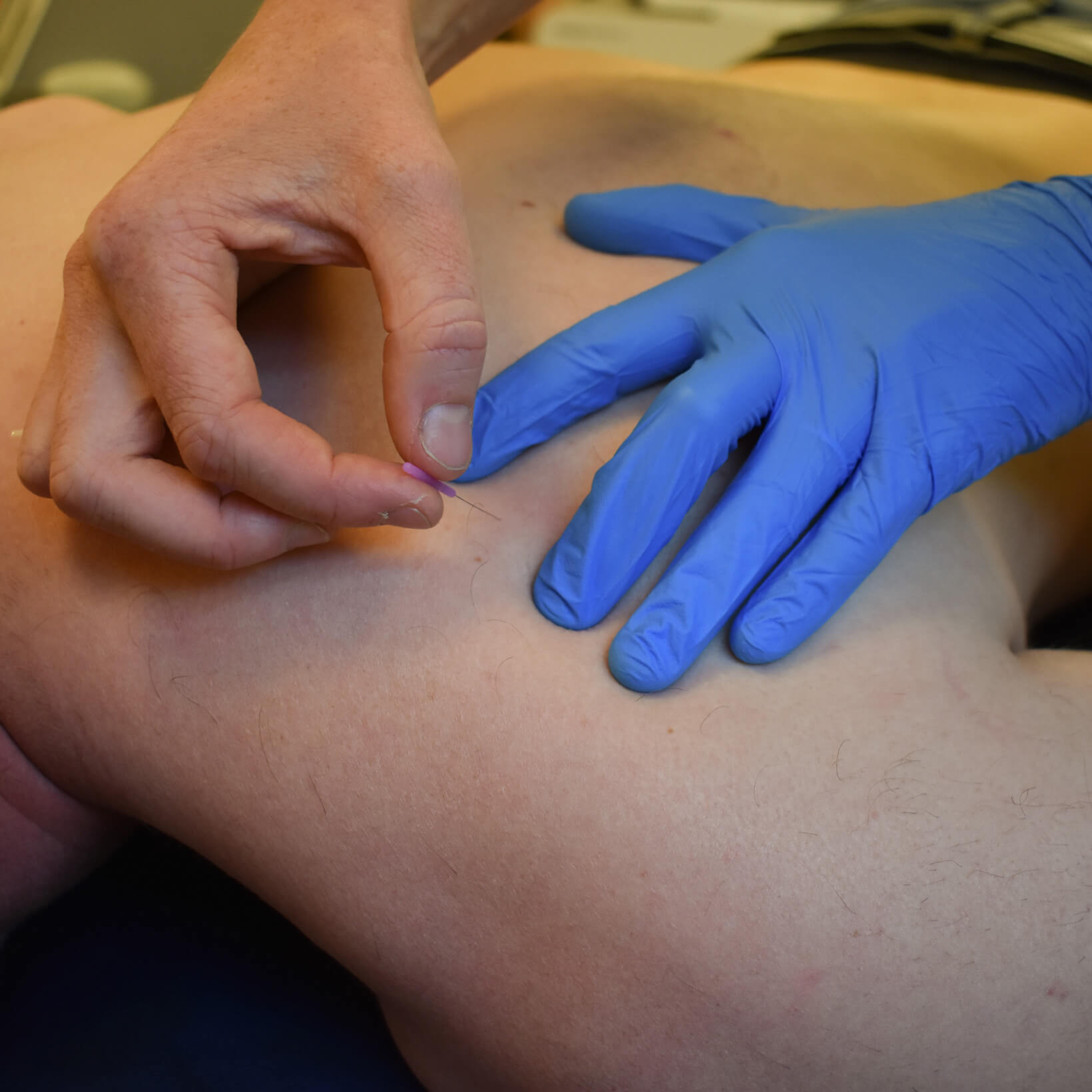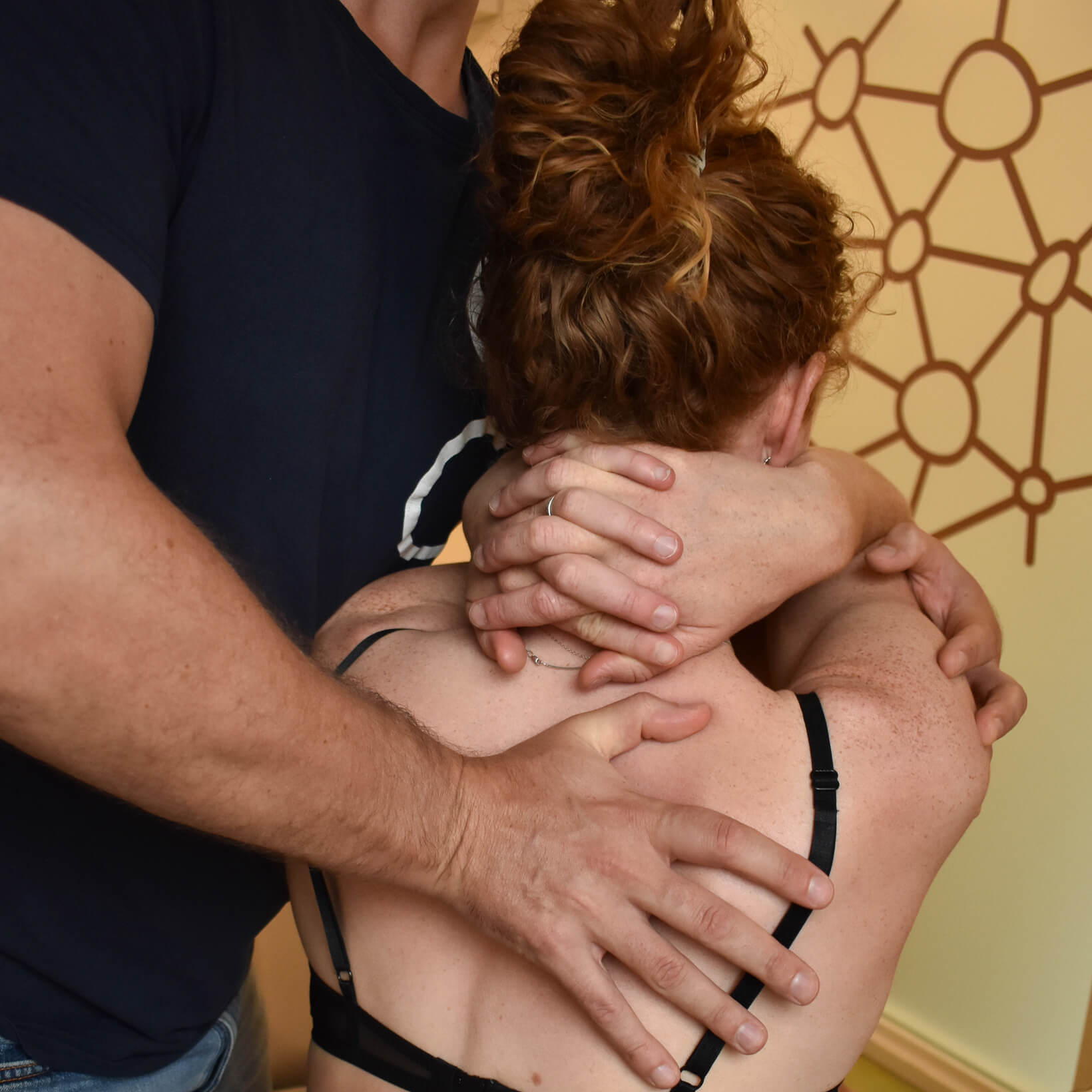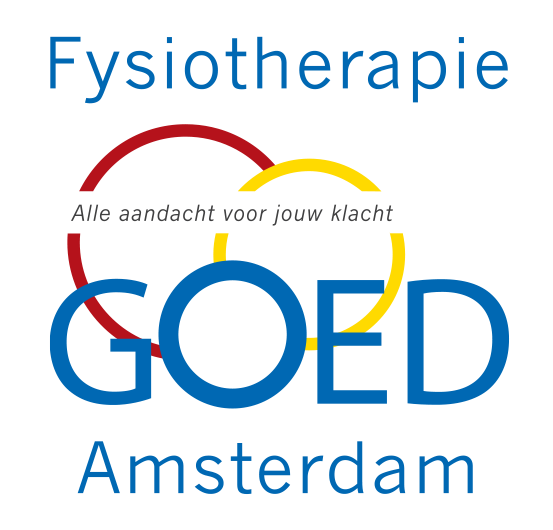Within physiotherapy we treat patients with many different complaints. These are mainly complaints of the musculoskeletal system, by which we mean complaints of, for example, joints, muscles and tendons.
You do not need a referral for an appointment for physiotherapy. You can make an appointment directly with us.
The physiotherapist then conducts a screening with the patient, which is part of the intake and the examination during the first treatment. The physiotherapist then assesses whether the patient is in the right place for physiotherapy treatment. If necessary, the physiotherapist can also contact the patient’s GP or other practitioner.
After the intake and the examination, the physiotherapist draws up a treatment plan together with the patient. This plan is evaluated in the interim and at the end of the treatment to see what progress has been made in the patient’s complaints.

Dry needling is an innovative treatment technique in physiotherapy. In this technique, the tension in the muscle is treated with thin acupuncture needles. This allows the muscle to relax in a quick and effective way.
Dry needling is often used as an addition to physiotherapeutic treatment for muscle complaints. The treatment technique can improve blood flow in the muscles, improve mobility in the joint and reduce local and radiating pain.
Dry needling can be used as an additional treatment method for many different complaints, including: tension headaches, neck complaints, low back complaints, tennis elbow and many other muscle-related complaints.
The physiotherapist will assess together with the patient whether dry needling can be a good additional treatment method for the complaints the patient is experiencing.
Dry needling treatments are part of the physiotherapy session. As a result, a session under a physiotherapy session is reimbursed from the supplementary insurance.
For dry needling you can contact the following physiotherapists: Dorien, Stijn, Maaike and Lucas.
We offer dry needling at multiple practice locations. Please contact our reception to make an appointment.
If you wish to be treated with dry needling, we request that you complete the informed consent in advance. See the link below for this.
There is a link coming up;), work in progress..

The aim of manual therapy is on the one hand to improve the movement of the joints and on the other hand to improve posture and movements. For this, the manual therapist uses a number of specific techniques that can be applied to/in the joints. The aim is to reduce limitations in daily activities.
Manual therapy is often also combined with exercises so that the patient can independently keep the joints mobile and strengthen the muscles.
Manual therapy is a specialized Master’s study aimed at improving joint functions and learning specific techniques for this. Much attention is also paid to the latest scientific developments, such as reading and interpreting scientific studies.
We tailor the treatment based on scientific research, your needs as a patient and of course our own experience.
Manual therapy can be used for various complaints, such as for example: neck and back complaints. It can also be used effectively for complaints such as headaches, dizziness and nerve pain in the arms or legs.
After an extensive examination, the manual therapist determines together with the patient whether manual therapy can be a good additional treatment method for the complaint.
For manual therapy you can contact the following manual therapists: Dorien, Lucas, Dana and Thörsten.
We offer manual therapy at our various practice locations. Please contact our reception to make an appointment.
If you wish to be treated with manual therapy, we request that you complete the informed consent in advance. See the link below for this.
There is a link coming up;), work in progress..
Most insurers currently limit manual therapy to 9 treatments per year. If you want to continue using manual therapy after this, we will charge you a personal contribution of €10 per treatment or the then applicable practice rate for manual therapy.
In consultation, your treatment can also be transferred to one of our physiotherapists.
McKenzie therapy is a treatment method developed in New Zealand and is now used worldwide. This is a method that has been developed for complaints that arise from the spine. This method can therefore be used for many different complaints, including back complaints and neck complaints that are associated with radiation complaints in the arm or leg.
McKenzie therapy is accompanied by homework exercises. After the complaints have diminished after a number of treatments, homework exercises are given to the patient in order to further reduce the complaints at home. In addition, necessary tips and postural advice for the longer term are discussed.
For a Mckenzie therapy treatment you can visit our therapists: Paul and Peter.
We offer McKenzie therapy at our various practice locations. Please contact our reception to make an appointment.
Medical tape, also called CureTape, is a stretchable colored tape that can be used as an additional treatment method in physiotherapy for various complaints.
The tape stimulates the self-healing capacity of the body and provides support and stability in the joint and muscle. Due to the elasticity of the tape, there is a reduction in pressure, which stimulates blood circulation and lymphatic drainage. In addition, the pressure on the pain receptors also decreases, so that the experience of the pain can be reduced.
Due to the stretchable properties of the tape, it does not completely restrict movement when taping a joint such as an ankle or shoulder. As a result, the joint can still make its natural movement, but when the joint comes more into the final position, the stretch on the tape increases.
The medical tape is made in such a way that it is ventilating and skin-friendly. In addition, the tape is water-resistant, so you can easily shower with it. The tape stays on the skin on average between 3 to 6 days.
We offer medical taping at our various physiotherapy practice locations. Please contact our reception to make an appointment.
If you wish to be treated with Medical taping, the practice will charge you €16 at your own costs for a roll of CureTape. This can often be used several times.
You are free to bring your own purchased tape with you during the treatment.
Cesar- Mensendieck remedial therapy is a treatment method that is performed by a remedial therapist. The treatment is aimed at becoming aware of a good way of moving in daily activities.
Together with the patient, the remedial therapist looks at the posture and how movements are performed. The remedial therapist then works with the patient, including exercises and advice, to optimize the posture.
Remedial therapy can be a good additional treatment method for many different complaints, such as neck complaints at an office job or back complaints at a profession where heavy lifting is required. The remedial therapist will examine the complaints and decide together with the patient which treatment method suits the patient best.
In remedial therapy, the therapist and the patient look for a long-term solution that the patient can work with in the home and work situation. In this type of therapy we assume an active recovery in which exercise and movement play a central role to prevent the complaints from continuing or returning.
A remedial therapist likes to work together with a physiotherapist, so that the therapists can work together to achieve an optimal treatment method.
For remedial therapy you can contact our therapist: Peter.
We offer remedial therapy at our various practice locations. Please contact our reception to make an appointment.
In our practice we offer ultrasound as additional diagnostics for all different kind of complaints.
Various complaints can be identified by means of an ultrasound examination. On the ultrasound, muscles, joints and tendons can be viewed. After this, a diagnosis can be made quickly and a treatment plan can be drawn up together with the patient.
In addition to examining the complaints, ultrasound can also be used to map the progress and effects of a treatment process.
The ultrasound examination is done with a device that is applied to the area of the complaint using gel. High sound waves are sent which reflect with the tissue of, for example, the muscle. From this a dynamic image of the muscle can be read on a monitor and a cause of a complaint can be visualized.
An ultrasound examination is a quick and safe method to visualize the complaints. The sound waves are not harmful and do not cause any complications.
For an ultrasound consultation you can visit our therapists: Paul and Wibbo.
We offer ultrasound at two of our locations: Schellingwoude and Amstelkwartier.
Please contact our reception to make an appointment.
We charge additional costs for the ultrasound consultation in addition to the costs for the physiotherapy treatment.
The additional costs are €49.50.
These costs cannot be submitted to the health insurer.
EPTE is the Dutch abbreviation for Ultrasoundguided Percutaneous Electrolysis Therapy. This is a treatment method that, as an addition, can be used for various long-term tendon complaints of the shoulder, elbow, knee and ankle. For an EPTE treatment, the location and nature of the complaint is first mapped out by means of a functional examination and ultrasound.
In an EPTE treatment, a thin needle is accurately inserted into the tissue under ultrasound guidance. After this, electricity is returned via the needle to the core of the problem area. The mild form of electricity can initiate multiple processes that improve tissue repair.
The effects of the treatment are caused by various processes that occur in the treated area. It has been shown that there is an improvement in blood circulation and an increased PH value, which promotes the production and repair of tendon tissue.
For an EPTE therapy treatment you can visit our therapists: Paul and Wibbo.
We offer EPTE therapy at our Schellingwoude and Amstelkwartier practice locations.
Please contact our reception to make an appointment.
We charge additional costs for the EPTE treatments in addition to the costs for the physiotherapy treatment.
The additional costs are €30 for 5 sessions.
Ultrasound: €49.50.
These costs cannot be submitted to the health insurer.
Shockwave therapy (ESWT) is a type of therapy that treats sensitive areas in the body with shock waves. With the help of a shockwave therapy device, these shock waves are transferred to the area to be treated.
Shockwave therapy uses shock waves to help the body recover faster.
The released energy is absorbed into the painful tissue via the treatment head. The body reacts to this and produces substances that promote recovery. Some substances create a mild inflammatory reaction, which speeds up recovery and improves blood flow.
Shockwave results in most cases for a good result.
The treatment method can be used for many different complaints. These are often tendon complaints that have persisted for a longer period of time. Common complaints in which shockwave therapy can be used as part of the treatment include heel spurs (plantar fasciitis), Achilles tendon complaints, knee tendon complaints, shin splints, foot complaints, elbow complaints and complaints in the shoulder with inflammation. The physiotherapist will assess together with the patient whether this treatment method can be used for the complaints.
There are two different types of shockwave therapy: radial shockwave and focused shockwave.
Radial shockwave provides energy over a larger area. This type of shockwave is suitable for, among other things: trigger point treatment, tendon infections and heel spurs (plantar fasciitis).
Focused shockwave gives a concentrated energy on a small surface in the body. This form is most commonly used to treat bone, CPPS, calcifications and treatments around the hip.
During the treatment with the physiotherapist, the pain area is first localized by the therapist. In a number of cases, additional examination is performed by means of ultrasound. After the diagnosis has been made and it has been shown that shockwave therapy is indicated, the shockwave treatment can start.
For shockwave therapy you can contact our physiotherapists: Irwin, Max and Paul.
We offer shockwave therapy at our Schellingwoude practice location. Please contact our reception to make an appointment.
We charge additional costs for the shockwave treatments in addition to the costs for the physiotherapy treatment.
Often a minimum of 5 treatments are needed to achieve a good result/effect.
The additional costs are:
Radial 5x: €15 (possibly additional treatments €3)
Focused 5x: €35 (possibly additional treatments €7)
Ultrasound: 49.50
These costs cannot be submitted to the health insurer.


